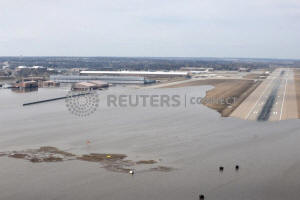|
Flooded U.S. Air Force base underscores
climate risk to security: experts
 Send a link to a friend
Send a link to a friend
 [March 19, 2019]
By Timothy Gardner [March 19, 2019]
By Timothy Gardner
WASHINGTON (Reuters) - Flooding at a U.S.
Air Force base in Nebraska that damaged buildings and forced the removal
of a plane integral to the nation's nuclear attack response highlight
the risks climate change poses to national security, experts said on
Monday.
U.S. President Donald Trump has repeatedly questioned whether humans
cause climate change and has been angered by assessments from his
military and intelligence agencies that say the phenomenon poses
national security risks.
Last week's "bomb cyclone" storm flooded about 60 structures including
30 buildings at the Offutt Air Force Base, said Ryan Hansen, a spokesman
for the 55th Wing, a unit providing reconnaissance, intelligence and
combat support to U.S. leaders.
Eight planes in the 55th Wing had to leave the base, Hansen said, and
workers might not be able to assess damage to hangers and maintenance
buildings until the end of the week.

One of the planes was a Boeing-made E4-B plane, one four the Air Force
has that are meant to serve as an aerial command center in case of
national emergency or destruction of ground bases, such as in a nuclear
attack. Two E4-B's were also damaged by a tornado at Offutt in 2017, CNN
reported at the time.
Francesco Femia, the co-founder of the Center for Climate and Security,
said the flooding shows that the White House needs to let the military
do its job in assessing the climate threat.
"This is an example of a vital threat to our national security from a
climate-related disaster, and more of this kind of thing is likely in
the future," Femia said.
While flooding from storm surges linked to climate change that could
damage sensitive electronics and mechanical equipment have long
threatened U.S. Naval bases like Norfolk, Virginia, Offutt is a reminder
that climate change also poses risks to bases far from sea.
[to top of second column]
|

Offutt Air Force Base and the surrounding areas affected by flood
waters are seen in this aerial photo taken in Nebraska, U.S., on
March 16, 2019. Courtesy Rachelle Blake/U.S. Air Force/Handout via
REUTERS

Offutt is also home to Strategic Command, which oversees the
country's nuclear arsenal. The Strategic Command headquarters, set
on a hill, was not affected by the floods, and neither was its new
building, expected to open in the spring.
"Given the president's denial of climate change ... I donít know if
ironic is the word to capture how strange it would be for the
results of climate change to adversely impact the president's
ability to control U.S. nuclear weapons in a crisis," said Stephen
Young, the Washington representative of the global security program
at the Union of Concerned Scientists, which advocates for investment
to protect bases from climate change threats.
The White House has considered forming a panel to assess the science
used in government climate risk reports that could be headed by a
retired physics professor who believes greenhouse gas emissions are
good for the planet.
The White House did not respond to a request for comment.
While climate change can't be blamed for a single storm, the vast
majority of scientists say emissions from fossil fuels and the
burning of forests are trapping heat in the atmosphere and making
storms and floods more intense.
(Reporting by Timothy Gardner; Editing by Bill Berkrot)
[© 2019 Thomson Reuters. All rights
reserved.]
Copyright 2019 Reuters. All rights reserved. This material may not be published,
broadcast, rewritten or redistributed.
Thompson Reuters is solely responsible for this content.
 |